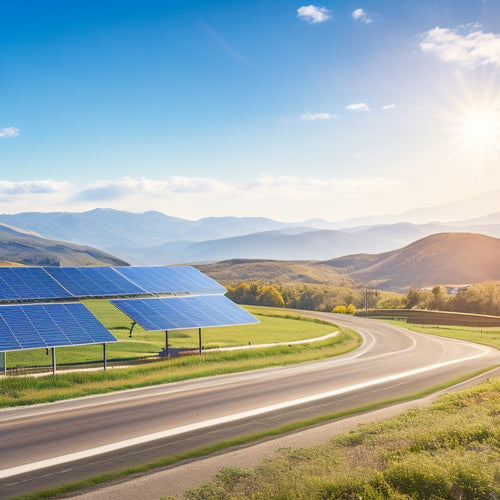
Why Homeowners Choose Renewable Energy Freedom
Share
By switching to renewable energy sources, you're joining a growing movement of homeowners who are taking control of their energy needs, reducing their reliance on the grid, and reaping significant cost savings, with some homeowners even eliminating their energy bills altogether. You'll enjoy fixed energy costs, financial predictability, and protection from rising utility rates and inflation. Plus, you'll reduce your carbon footprint and contribute to a cleaner environment. As you investigate renewable energy freedom, you'll uncover the numerous benefits that come with it, from increased property value to government incentives, and ultimately, a more self-sufficient and resilient energy future ahead.
Key Takeaways
- Homeowners choose renewable energy freedom to gain control over their energy needs and reduce reliance on the grid and traditional utility companies.
- Renewable energy significantly reduces energy bills, providing financial predictability and cost savings, while also serving as a hedge against rising utility rates.
- Transitioning to renewables allows homeowners to reduce their carbon footprint, supporting sustainable practices essential for environmental health and contributing to a cleaner environment.
- Investing in renewable energy increases property value and appeal, making homes more attractive to eco-conscious buyers and potentially selling for up to 17% more.
- Government incentives and financial support, such as federal tax credits and state rebates, make renewable energy more accessible and affordable for homeowners.
Renewable Energy Independence Benefits
Embracing renewable energy independence can revolutionize your lifestyle, freeing you from reliance on the grid and granting you extraordinary control over your energy needs.
By utilizing renewable resources, you can reduce your energy bills and enjoy a sense of security knowing that your energy supply is stable and sustainable.
Energy innovation has made it possible to integrate renewable energy systems into your home, providing you with a reliable source of power.
With renewable energy independence, you can also increase your property value and reduce your carbon footprint.
Furthermore, you can break free from grid reliance and cultivate community pride and ownership through shared energy initiatives.
Environmental Impact of Traditional Energy
You're likely aware that traditional energy sources, such as fossil fuels, greatly contribute to your carbon footprint, which has severe consequences on the environment.
Burning these fuels releases massive amounts of carbon dioxide and other pollutants into the atmosphere, leading to climate change and air pollution. By relying on traditional energy, you inadvertently participate in polluting the atmosphere, which has devastating effects on ecosystems and human health.
In fact, diminishing dependence on fossil fuels can lead to notable carbon emissions reduction, and utilizing renewable solar energy decreases reliance on non-renewable sources, which is essential for a sustainable future.
Carbon Footprint Matters
Approximately 65% of the world's electricity is generated from fossil fuels, a primary contributor to the staggering 36 billion metric tons of carbon dioxide released into the atmosphere annually.
As you rely on traditional energy sources, you're inadvertently contributing to this massive carbon footprint. It's crucial to recognize the impact of your energy choices on the environment.
By adopting sustainable practices and making eco-friendly choices, you can greatly reduce your carbon footprint. Renewable energy offers a cleaner alternative, allowing you to power your home while minimizing harm to the environment.
Polluting the Atmosphere
Fossil fuel-based power plants spew massive amounts of pollutants into the atmosphere, considerably contributing to environmental degradation.
You're likely aware of the negative impact on air quality, but did you know it also exacerbates climate change? The emissions released by these plants are a significant contributor to the problem.
By shifting to renewable energy, you can reduce your ecological footprint and support emissions reduction efforts. This change towards sustainable practices not only benefits the environment but also enhances community resilience.
Embracing green technology and sustainable energy solutions is essential for a successful energy shift.
As you consider your role in this movement, remember that every small step counts, and choosing renewable energy is a significant stride towards a cleaner, greener future.
Cost Savings With Solar Power
You'll see a significant reduction in your energy bills once you switch to solar power, as you'll be generating your own clean energy and relying less on the grid.
By utilizing the sun's energy, you'll be reducing your reliance on traditional energy sources, which means you'll be paying less to power your home.
With solar power, you'll be taking the first step towards energy independence, where you're in control of your energy costs.
Additionally, you can consider factors like cost calculation factors to optimize your solar energy system and maximize your savings.
Lower Your Bills
By investing in solar power, homeowners can considerably reduce their energy bills, and in some cases, even eliminate them altogether.
You can achieve significant cost savings by utilizing the power of the sun to generate electricity for your home. With solar power, you can reduce your reliance on traditional utility companies, opting for a cleaner, more energy-efficient alternative.
By increasing your energy efficiency, you'll use less energy from the grid, resulting in lower bills. Additionally, solar power can provide a hedge against rising utility rates, protecting your wallet from inflation.
Energy Independence
One of the most significant benefits of solar power is the energy independence it provides homeowners. By utilizing the sun's energy, you're no longer reliant on traditional energy resources, reducing your dependence on the grid. This means you'll have more control over your energy consumption and costs.
With solar power, you'll be adopting sustainable practices, reducing your carbon footprint, and contributing to a cleaner environment. You'll also be protected from rising energy prices, as solar power provides a fixed energy cost.
Freedom From Rising Energy Costs
As energy costs continue to skyrocket, homeowners are seeking refuge from the financial burden of relying on traditional power grids.
You're likely tired of watching your energy budget balloon with each passing year. By switching to renewable energy, you can break free from the cycle of rising costs and enjoy long-term savings.
With renewable energy, you'll no longer be at the mercy of fluctuating energy prices. Instead, you'll have a fixed energy cost that allows you to budget with confidence.
This means you can allocate your hard-earned money to other important areas of your life. By utilizing the power of renewable energy, you can take control of your energy budget and start building a more secure financial future.
Increased Property Value Potential
Your decision to switch to renewable energy not only frees you from the burden of rising energy costs but also has a significant impact on your property's value.
By investing in renewable energy, you're making your property more attractive to potential buyers, which can lead to increased property value. According to property assessments, homes with renewable energy systems can sell for up to 17% more than similar homes without them.
This is largely due to market demand, as eco-conscious buyers are willing to pay a premium for energy-efficient homes.
Government Incentives for Homeowners
Solar panel installations and energy-efficient upgrades can be costly, but the government is willing to foot part of the bill.
As a homeowner, you can take advantage of various government incentives to offset the expenses. These incentives can greatly reduce the upfront costs, making renewable energy more accessible to you.
Here are three government incentives you can benefit from:
-
Federal Subsidies: The federal government offers a 26% tax credit on the total cost of solar panel installations. This credit can be claimed when you file your taxes.
-
Local Grants: Many local governments and utilities offer grants or rebates for homeowners who invest in renewable energy. These grants can range from a few hundred to several thousand dollars.
-
State Tax Credits: Some states offer additional tax credits or rebates for renewable energy installations. These credits can be claimed in addition to the federal subsidy.
Energy Self-Sufficiency and Security
With government incentives helping to offset the costs, you're one step closer to achieving energy independence.
By investing in renewable energy systems, you'll reduce your reliance on the grid and enjoy energy autonomy. This means you'll have control over your energy production and consumption, ensuring a consistent supply of power even during outages.
Furthermore, decentralized renewable energy systems enhance grid resilience by reducing the strain on the grid and providing backup power during emergencies. As a result, you'll experience increased energy self-sufficiency and security, knowing that you're prepared for any situation.
Frequently Asked Questions
What Maintenance Is Required for Solar Panels at Home?
You'll need to perform occasional solar panel cleaning to guarantee ideal energy production, but aside from that, maintenance is minimal; installation costs are a one-time expense, and panels typically come with a 25-year warranty, giving you peace of mind.
Can I Sell Excess Energy Back to the Grid?
You can sell excess energy back to the grid through a process called net metering, earning energy credits that offset your consumption; a grid connection allows you to feed excess energy back into the system.
How Does Energy Storage Work With Renewable Systems?
You integrate energy storage into your renewable system using advanced battery technology, allowing you to store excess energy generated during the day for later use, ultimately achieving energy independence and a reliable power supply.
Are Renewable Energy Systems Noisy or Obtrusive?
As you consider renewable energy, imagine a silent guardian watching over your home; in reality, most systems are quiet, with noise levels similar to a refrigerator, and their sleek, modern designs blend in, allowing strategic system placement to minimize neighborhood impact.
Can I Install Renewable Energy Systems Myself?
You can attempt a DIY installation, but verify you've researched system compatibility and local regulations; however, it's recommended to hire a professional to guarantee a safe, efficient, and warranty-maintaining installation that meets your specific energy needs.
Related Posts
-

Is This the Future of Alternative Energy Systems
Yes, alternative energy systems are shaping the future of energy. Innovations in solar and wind technologies are driv...
-

Is Switching to Green Energy Solutions Easy
Switching to green energy solutions isn't just easy; it's also beneficial. You can greatly cut utility costs and enjo...
-

Essential Hiking Lights for Safety and Fun
When you're hitting the trails, essential hiking lights are vital for safety and fun. A lightweight headlamp offers h...


